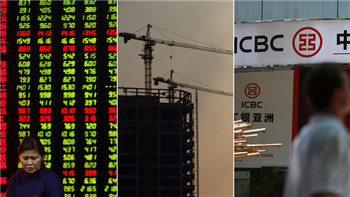(单词翻译:单击)

Aggressive policy action is now a regular feature of global markets — Haruhiko Kuroda had his bazooka, while Ben Bernanke took to a helicopter.
积极的政策行动如今是全球市场的一个常态化特点——日本央行行长黑田东彦(Haruhiko Kuroda)曾提到他的“火箭筒”,而美联储前主席本伯南克(Ben Bernanke)曾表示不惜用直升机撒钱。
But in China, falling asset prices have met a full-scale invasion of the market, securing an expensive victory that many believe could yet prove fleeting.
但在中国,连连下跌的资产价格导致市场遭到全面入侵,结果是一场代价高昂的胜利,而许多人相信,这场胜利仍可能被证明是短暂的。
After three months of huge government intervention to halt diving stocks, Chinese authorities appear ready to declare their mission accomplished. Zhou Xiaochuan, governor of the People’s Bank of China, told a G20 meeting last weekend that the stock market correction, which has left the Shanghai Composite nearly 40 per cent below its June high, is now “mostly over”.
在政府为了遏止股价跳水而大举干预三个月后,中国官方似乎准备宣告他们的任务已经完成。中国人民银行(PBoC)行长周小川上周末在20国集团(G20)会议上表示,已使上证综指(Shanghai Composite)从6月高点下跌40%的股市调整“已大致到位”。
In the days since, the Shanghai Composite has barely budged, rising 1.2 per cent this week. Having tumbled from a peak of 5,100 points in mid-June, the index seems to have found a new comfort zone just above 3,000 points, where it has been trading since the last week of August.
自周小川表态以来,上证综指几乎没有变化,本周上升1.2%。在从6月中旬的5100点峰值大幅下跌后,该指数似乎已在3000点上方找到了新的舒适区,自8月最后一周以来一直处于这一水平。
Domestic analysts have been quick to express their relief. “Given that recent policy measures have restrained speculative activities and deleveraging has run its course for the time being, there is hope for a market rebound,” says Wang Fen at Shanghai Securities. Meanwhile, Soochow Securities has released a report entitled: “The severe winter is past, and the time has come for spring planting.”
国内分析师很快表示他们松了一口气。“鉴于近期的政策措施已经收敛了投机活动,而去杠杆化也暂时告一段落,市场有望反弹,”上海证券(Shanghai Securities)的王芬表示。与此同时,东吴证券(Soochow Securities)近日发表的一份报告题为“寒冬已去春耕适时”。
Not everyone is convinced, however. Average equity valuations may have come down significantly from the peak, but many stocks — especially small-caps — still trade at price to earnings ratios far above their historical trend. Despite the huge falls in the Shanghai and Shenzhen indices, both have risen a third over the past 12 months, making them the best performing markets in the world. The bubble, say sceptics, has not yet completely burst.
然而,并非所有人都确信这一点。股票的平均估值已从峰值大幅回落,但许多个股(尤其是小盘股)的市盈率仍远高于历史趋势线。尽管上海和深圳的股指均已大幅下跌,但两者在过去12个月仍累计上涨三分之一,是全球表现最佳的股市。怀疑人士称,泡沫尚未完全破裂。
“The government is supporting the market at too high a level”, says Francis Cheung, China equity strategist at CLSA. “They are going to lose. At some point, they will have to let go.” He has a price target for the Shanghai Composite of 2,700, implying a further 15 per cent drop from current levels.
“政府在过高的水平支撑市场,”里昂证券(CLSA)中国股票策略师郑名凯(Francis Cheung)表示。“他们将会失守。在某个时间点,他们将不得不放弃。”据他判断,上证综指的目标点位应该是2700,这意味着从目前水平进一步下降15%。
Even if Beijing has succeeded in putting a floor under share prices, it has done so at great expense. The government itself has deployed as much as Rmb1.5tn ($236bn) to support the stock market in the past three months, according to Goldman Sachs estimates.
即使北京方面已经成功地为股价筑底,但它付出的代价也实在巨大。据高盛(Goldman Sachs)估计,政府在过去三个月动用了多达1.5万亿元人民币(合2360亿美元)支撑股市。
The costs of rescuing the market have not just been financial. The intervention has derailed some key reform initiatives, such as shifting capital raising from commercial bank loans to the equity market. To cut the supply of new shares into the market, initial public offerings have been frozen.
救市的成本还不仅是财务上的。此轮干预已经扰乱了一些关键的改革举措,比如把筹资的主要渠道从商业银行贷款转向股市。为了减少股市的新股供应,首次公开发行(IPO)已被冻结。
Trading volumes have collapsed as government action, capital outflows and ructions in the currency markets have sapped liquidity. Turnover on the Shanghai stock exchange on Tuesday fell to $43bn, the lowest daily amount since February and down from a peak of $212bn in early June. Futures volumes have taken a more severe hammering.
近期股市成交额大幅下降,因为政府采取的行动、资金外流以及汇市的风波都吸走了流动性。本周二,上海证交所成交额降至430亿美元,这是自2月以来的最低单日成交额,与6月初2120亿美元的高位不可同日而语。期货成交额受到更加沉重的打击。
“Futures are dead, options are dead, margin finance is dead. Brokers are unwilling to lend, so there’s no liquidity”, says Hao Hong, strategist at Bocom International.
“期货死了,期权死了,保证金融资死了。券商不愿放贷,所以没有流动性,”交银国际(Bocom International)分析师洪灏表示。
Meanwhile, the longer term goal of increasing foreign participation in domestic financial markets has taken a significant step backwards after new rules were introduced that banned short selling and big share sales.
与此同时,在出台新规则禁止卖空、禁止出售大笔股票后,提高外资在国内金融市场参与度的长期目标向后倒退了一大步。
“Nobody wants to own an asset without knowing if they can sell,” says Bob Browne, chief investment officer at Northern Trust, the US fund manager with $960bn in assets under management.
“没有人想要拥有不知道可不可以出售的资产,”旗下管理着9600亿美元资产的美国基金管理公司北方信托(Northern Trust)的首席投资官鲍勃布朗(Bob Browne)表示。
Investors and brokers have also found themselves under investigation by the authorities. And despite official declarations that the crisis is over, many believe there is further to fall, especially with the economy continuing to slow.
这还不算,一些投资者和经纪商发现自己受到当局的调查。尽管官方宣告危机已经结束,但很多人相信还会进一步下跌,尤其是鉴于中国经济正继续放缓。
“Even after the plunge, we haven’t really capitulated. It is very difficult to say we have bottomed out and fundamentals aren’t getting better,” says Mr Hong. “What’s the reason to buy?”
“即使市场已经大幅下跌,但我们还没有看到真正的投降。很难说我们已经触底,而基本面也没有好转,”交银国际的洪灏表示。“买入的理由是什么?”


